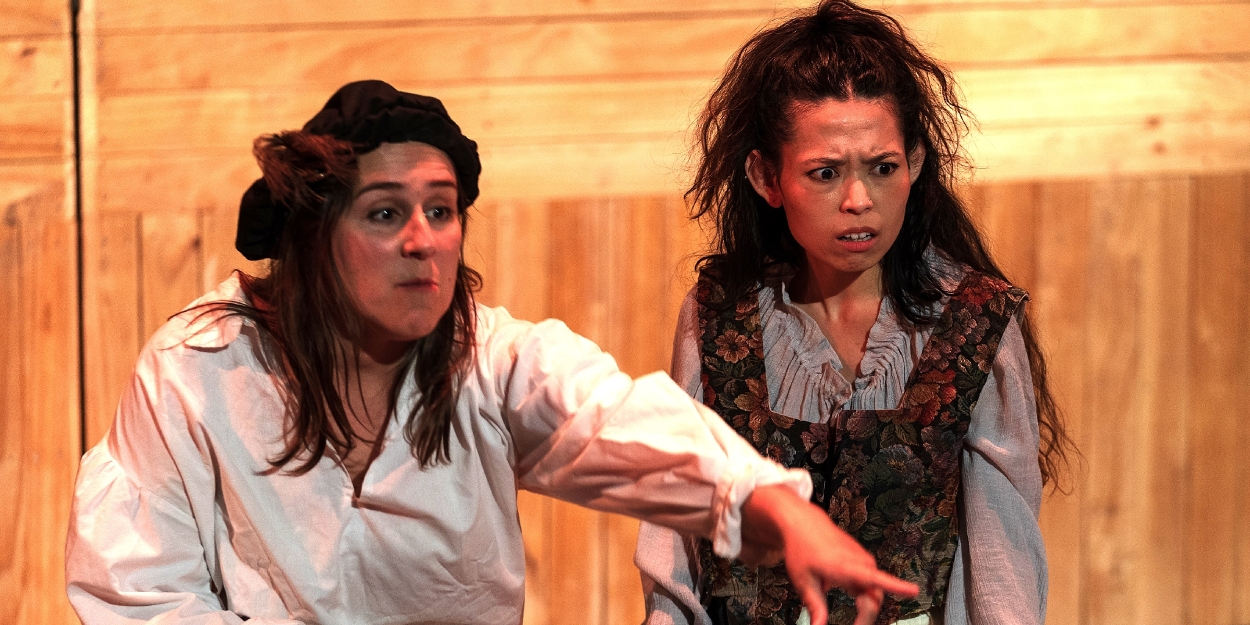Review: THE TAMING OF THE SHREW at The PUMPHOUSE Theatre, Takapuna, Auckland
Enjoy the comedy until Feb 15th

“We will have rings and things and fine array”
“THE TAMING OF THE SHREW” is one of the most frequently performed plays of Shakespeare for over 500 years, and there are many challenges inherent in bringing this somewhat controversial comedy to the audience with a fresh perspective. Shakespeare’s plays were largely male character dominant with a handful of female characters. This reflected the fact the cast was male, as acting certainly wasn’t “suitable” for women in Elizabethan times. Congratulations to the director, Mags Delaney-Moffatt, for her bold choice to cast the production with an all-female cast, reversing the script on gender roles.
As the play’s concept is largely about to behave correctly as a man or a woman in society, and equates masculinity with dominance and femininity with subservience, it’s a clever way to show that women can play those roles with ease. The play makes fun of “strong” women because they were really frowned upon in Shakespeare’s time. Mags Delaney-Moffatt says she focused less on Kate’s supposed taming by Petruchio and upped the element of how foolish men can actually be in pursuit of love. She wanted Petruchio to be as shrewish as Kate is in his behaviour at home and so leave the audience wondering who is the shrew and who is tamed.
Strong teamwork and genuine camaraderie within the 14 cast members who delivered the storyline with a sense of fun, genuine delight and effective comic awareness. Well energised and physicalised comic characterisation from Tranio (Kasia Jarecki), Grumio (Lizzie Morris) and Petruchio (Heather Warne). These three inhabited their characters with truth, directing their wit with varied tempo, careful vocal dynamics, and sustained eye contact engaging the audience. Much of the comic action is deftly delivered to the groundlings, as it would have been in Shakespeare’s time. As the season progresses, the cast can further relax and further develop the aspects of farce and slapstick inherent in it.
One of Shakespeare’s favourite themes was appearance and reality – and how easily these are confused. Shakespeare’s timeless truth that not everything you see is what it seems to be! And “The Taming of the Shrew” is a fine example of a plot peppered with pretence and disguise, with havoc and humour being created through characters professing to be someone they are not – and the dramatic irony this creates. There was a range of credible characterisation but it would help the audience for characters to further embody “age” in their posture and manner as this element was hard to distinguish.
The plot of the play is really two parallel “love” plots – based on the two daughters of Baptista (Carmen Adams) Katerina (Matilda Chua) and Bianca (Alice Dibble). One concerns the beautiful, mild-tempered Bianca beset by suitors – some of them old such as Gremio (Millie Knights), Hortensio (Sapphire Glynn), and even one disguised as a tutor, Lucentio (Samantha Ellwood). Lucentio swaps places with his servant, Tranio who now pretends to be Lucentio, wooing Bianca himself. This leads to further complications when the pretend Tranio/Lucentio gets a pretend father Vicentio (Tasman Smail) in order to wed Bianca, but the real Vicentio (Jes Iskander) turns up!
In order for Bianca to be married to anyone, Baptista insists that shrewish, ill-mannered and headstrong Katherina must be married first. This is the motivation of the second interweaving plot. When Petruchio arrives to “wive it wealthily in Padua”, Hortensio encourages him to take advantage of the dowry being offered. “Nothing comes amiss so long as money comes withal.” The comedy might appear unkind – poor Katerina – her groom treats her poorly, coming to the wedding late and disrespectfully dressed. Is he to be admired? She is not allowed to attend the wedding breakfast, and is “tamed” by ill-treatment at their home. “Killing her with kindness” says Petruchio. Superb physicality and vocal dynamics from Heather Warne . But you can’t judge by appearances, warns Shakespeare. Katerina comes to understand that, when she agrees to let Petruchio have his way, she will be paid back. It remains her choice.
Admirable work from Matilda Chua with the very difficult transition from surly, short-tempered shrew to “obedient” wife in the final scene of the play. She delivers the contentious wifely advice with thoughtful pace and clear connection to the intention of the words. We can believe she allowed herself to be “tamed.“ Lucentio comments that “Tis a wonder, by your leave, she will be tamed so.” Mags Delaney-Moffatt crafted her own slick twist ending on the action of the final scene, bringing equality into the "bet" and a fitting comment on the final lines. Well done.
The 2025 Summer Shakespeare in the Park (RICHARD III and THE TAMING OF THE SHREW) runs January 21 – February 15. Book at www.pumphouse.co.nz
Reader Reviews

Videos

